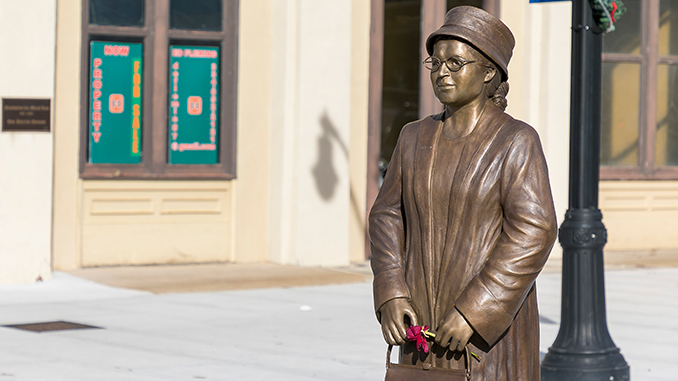
Here are a Few Montgomery Women Who Made Their Marks on History
Published: March 13, 2021
Throughout history, African American women in Montgomery, Alabama have struggled and fought valiantly for equality, from the civil rights movement and the right to vote to today’s ongoing battles. Home to world-changers like Rosa Parks and the often-overlooked Georgia Gilmore, Montgomery has long been a place where women have faced intolerable issues head-on, initiating unprecedented change for the better.
The destination invites visitors to commemorate women’s history month during the month of March and all year long by walking the path of those leaders who came and fought for change before us and to meet today’s leaders like Wanda Battle, who continues to teach the hard truths from one of the most turbulent periods in modern American history.
Just who are they?
Sheyann Webb-Chritburg: In 1965, hundreds of protesters marched from Selma to Montgomery, demanding an end to discrimination in voter registration. As the group of peaceful protesters, including women and children, began the march, officials attacked them with clubs and tear gas on the Edmund Pettus Bridge in an effort to scare and terrorize. Sheyann Webb-Chritburg, known as Dr. Martin Luther King Jr.’s “Smallest Freedom Fighter” at only nine years old took part in this historic moment, later referred to as Bloody Sunday.
Rosa Parks: Arrested 10 years prior to Bloody Sunday in 1955, Rosa Parks is best known for her pivotal role in the Montgomery Bus Boycott, igniting the civil rights movement and sparking change when she refused to give up her seat to a white man. Today, visitors in Montgomery can visit the Rosa Parks Museum to learn about the “first lady of civil rights” and take a photo with the newly installed Rosa Parks statue, steps from where she boarded the fateful bus.
Claudette Colvin: Claudette Colvin was arrested on the corner of Bibb and Commerce street in downtown Montgomery for refusing to vacate a City Lines bus seat for a white passenger in 1955. Claudette, a 15-year-old at the time of her arrest, was charged with assault and battery, disorderly conduct and violation of city segregation laws in a case that predated Rosa Park’s famed stand.
Georgia Gilmore: The 382-day bus boycott was an enormous contribution to the civil rights movement that also demonstrated the incredible economic power of the Black community in Montgomery at the time. According to monthly operating reports, the daily loss of 30,000 to 40,000 fares totaled a financial loss of $715,786 from December 1, 1955 to December 31, 1956, which is equivalent to nearly $7 million today. This dealt a devastating blow to the bus system and forced the local government and white population to understand the role the Black community played in the economy. In order to solve transportation needs, the community tapped into its innovative and entrepreneurial spirit and created “rolling church” taxi systems and Georgia Gilmore’s “club from nowhere.” Gilmore, who worked as a cook, decided she would use her culinary talents to feed and fund the resistance. She organized women to form this “club,” a clandestine group that prepared savory meals (fried chicken sandwiches, fried fish, pork chops, greens, lima beans) and baked goods (peach pie, poundcakes) and sold them out of their homes, in local establishments and at protest meetings.
Wanda Battle: The current tour director of the Dexter Avenue King Memorial Baptist Church, Wanda Battle, greets everyone who visits the church with a hug and leads discussions about human rights and social justice through today’s lens. She preaches love, faith and compassion just as Dr. King shared in his work and often makes each tour personal. Battle leads by the quote from Mahatma Gandhi, “You must be the change you wish to see in the world.” Battle is one of many modern personalities that visitors will encounter on a visit to Montgomery who share the authentic truths from America’s tainted past and are helping people look to a brighter future.
